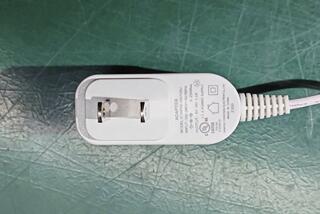Implanted Defibrillators Recalled by Manufacturer
- Share via
Under pressure after malfunctions in at least 45 implanted defibrillators, including two that are suspected in patient deaths, Guidant Corp. on Friday recalled nearly 50,000 of the devices worldwide.
For the Indianapolis-based company -- its stock price dropped nearly 2% on the news -- the recall means a financial blow as it prepares to be acquired by health giant Johnson & Johnson. For many patients, it means surgery to replace suspect devices.
Implanted defibrillators monitor the heart and deliver electrical jolts as needed to correct potentially lethal irregularities in the heartbeat. The problem, Guidant said, was that the devices could, without warning, develop a short circuit that would prevent them from delivering the shock when needed.
Like many similar devices, the defibrillators are implanted close to the skin, making replacement relatively simple. And the models being recalled are mainly older versions that will soon need replacement anyway.
Still, “it’s a big problem and it’s going to be a very expensive problem for the company,” said Dr. Kelly Tucker, a cardiologist with the Orange County Heart Institute in Orange. “But it’s not insurmountable. As long as we can take care of the patients, that’s our concern.”
Dr. Zian Tseng, a cardiologist at UC San Francisco Medical Center, agreed. “We’re advising patients not to panic. I know it sounds scary, but overall the safety history of cardiac devices is excellent,” said Tseng, who estimates he has about 80 patients with the recalled devices.
“The risk of the devices is less than not getting the device at all if you need it to save your life,” Tseng said.
Doctors and patients will have to weigh the risks and benefits of replacing suspect defibrillators. Patients with some types of heart problems could be more seriously affected by a malfunction than others, but some -- particularly those who are in frail health -- could be better off avoiding the replacement surgery.
Tseng said about half of his affected patients, for example, would need to have surgery because of the recall: “We’ve been getting calls today, and we’ll be contacting our patients immediately.”
Dr. William Bommer, a professor of medicine at UC Davis, said the recall meant Guidant probably would pay for the replacement procedure. The devices run $25,000 or more, and the replacement procedure is an additional $5,000 to $20,000, he said.
In an earlier notice about the malfunctions, Guidant told physicians it would cover replacement only under regular warranties that provide less money for older devices, Bommer said. That was a concern to physicians.
“That may work for a tire, but it won’t work for a defibrillator, where a life is at stake,” he said. “If a patient had to have this, you don’t want them to say, ‘Can we afford it?’ ”
Wes Granger, who has had a Guidant defibrillator since January 2001, was not unduly worried about the recall. He said he was planning to have it replaced at the end of the year when the batteries were beginning to fade.
Granger, 73, of Orange, said he would be happy to have the device replaced sooner if it were to develop a problem.
“About four months after I had mine put in, it went off several times,” he said. “If that thing had not been in there, I wouldn’t be here.”
The Food and Drug Administration said it did not require Guidant to issue the recall. In recent months, however, the company has been criticized for failing to notify doctors after it learned of problems with its Ventak Prizm 2 DR defibrillator.
The New York Times has reported that Guidant accumulated malfunction reports for at least three years before notifying physicians of an apparently related death this spring.
Ronald W. Dollens, Guidant’s chief executive, alluded to the controversy over its failure to immediately report problems to doctors and patients in a statement issued Friday with the recall: “Guidant is committed to establishing industry guidelines and processes to determine when, how and under what circumstances adverse events should be communicated to doctors and patients.”
The Prizm 2 DR (Model 1861, made through April 16, 2002) is among the devices the company recalled. The recall also includes the Contak Renewal, Model H135, and the Contak Renewal 2, Model H155 (both made through Aug. 26, 2004). Also recalled were the Ventak Prizm AVT, Vitality AVT, Renewal 3 AVT and Renewal 4 AVT models.
Neither Guidant nor the FDA made recommendations on whether individual patients should have the devices replaced.
They said that patients should consult with their doctors and take their individual medical condition into consideration. The FDA said removal and replacement may pose some risk.
Cardiologist Tucker said the procedure was simple and safe, requiring, at most, a night’s stay in a hospital.
The devices are designed with the periodic replacement of the pulse generator component in mind. That component, which is about the size of a small pager, is inserted into the chest wall between the skin and the muscle.
The shock is delivered to the heart via a wire lead that is threaded through a vein in the heart. That part of the device is designed to last for the life of the patient under normal circumstances and would not have to be replaced as a result of this recall, Tucker said.
The FDA said a patient who felt an electrical shock from the devices should call his or her doctor immediately.
Patients who hear a “beeping” from a Contak Renewal or Renewal 2 device should contact their doctors immediately or go to the nearest emergency room, the FDA said.
Shares of Guidant fell $1.20 on Friday, closing at $72.46. In December the company agreed to be acquired by Johnson & Johnson, the world’s biggest maker of medical devices, for $25.4 billion.
*
Times staff writers Debora Vrana and Ricardo Alonso-Zaldivar contributed to this report.
More to Read
Inside the business of entertainment
The Wide Shot brings you news, analysis and insights on everything from streaming wars to production — and what it all means for the future.
You may occasionally receive promotional content from the Los Angeles Times.











